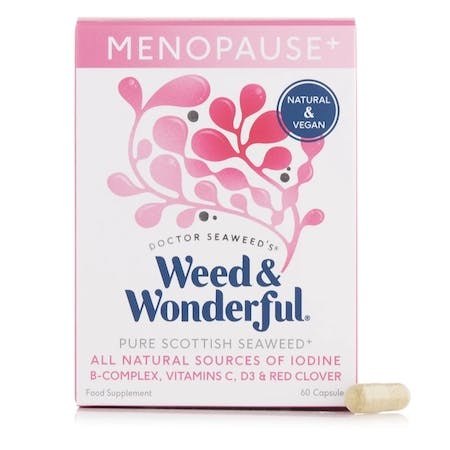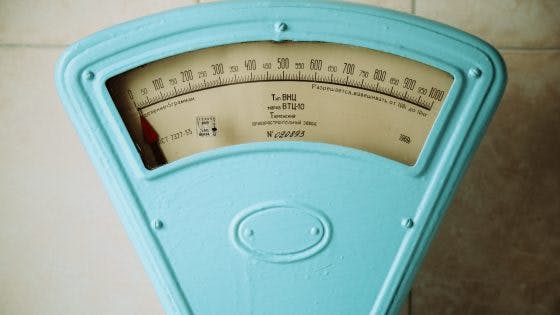What’s The Deal With Menopause Weight Gain?
7 minutes read
The menopause can throw all manner of questions for those of us who are just experiencing it, or have yet to – not least the possibility of menopause weight gain. While common side-effects include hot flashes, reduced libido, night sweats and anxiety, menopause and weight gain are also strongly linked.
Some of us experience weight gain from as young as our early-40s if we are perimenopausal, while others can notice it right until the end of our menopause when we’re in our 50s. So why do we experience weight gain during menopause and what can we do about it? Read on for more information and some handy advice…
What Is Menopause Weight Gain?
If you find yourself nodding along to the above in recognition, then you’re not alone. Whether it’s perimenopausal weight gain or post menopause weight gain it’s something that affects many of us around this particular life stage. So what causes it? Registered nutritionist Emma Bardwell sheds some light on the matter. (Spoiler alert – it isn’t due to your metabolism suddenly slowing down, as many might think…)
“Your basal metabolic rate (BMR) is the energy you need to simply stay alive: to breathe, to keep your heart beating, to circulate blood – many of us know this as our ‘metabolism’,” she explains. “We used to think metabolism slowed down during menopause but a recent study showed it actually doesn’t decline until our 60s and even then it’s a fairly insignificant change. So we can’t blame it on that.”

So what else could be the culprit? “Many of us unwittingly become more sedentary during midlife,” Bardwell notes. “Hormonal fluctuations mean we’re often fatigued and in turn, our appetite increases and our desire to exercise becomes blunted, which affects the amount of energy (or body fat) we burn.”
But that isn’t the end of the story. “On top of that, fat cells produce small amounts of oestrogen, which of course your body wants to hang on to during perimenopause at all costs – so it seems much harder than ever before to lose weight,” she continues.
“Add stress into the mix, which encourages fat to be laid down around the middle, some genetics, plus a potential loss of insulin sensitivity as you age and you have the perfect storm for weight gain.” So now you know what causes weight gain during menopause what can we do to prevent it?
How Can I Stop Menopause Weight Gain?
The solution to menopause weight gain might not be as straight-forward as you might think. “Trying to lose weight by focusing on food is like trying to quit drinking by focusing on alcohol,” says Bardwell. “In clinic the best results occur when women look at their eating habits and behaviours, rather than purely focusing on calories.”
She continues, “When I work with clients we start by putting everything they eat under a microscope and deciding what can be tweaked. Small changes get results but it’s important to be realistic. We want consistency, not perfection and nothing changes overnight – quick fixes rarely create long-lasting weight loss,” she warns.
“You can follow a similar process yourself by using an app like Nutracheck or simply keeping a food diary and noting down what you consume each day for a week and looking at patterns of eating behaviours that come up. I have a whole chapter in my book The Perimenopause Solution where I talk about actionable steps to losing body fat.”

According to the British Dietetic Association, muscle-building exercises such as weight training are also vital during menopause, stating on their website:
“During the menopause, muscle mass reduces which means that you may need fewer calories. Over time this can lead to weight gain. Being careful about how many calories you consume, your portion sizes and doing more physical activity can help prevent weight gain. Resistance activities, such as using weights, are especially important to both preserve and build muscle mass. [Whilst] thirty minutes of fast walking a day could lead to around 7kg (15lb) weight loss in a year, and also reduce the risk of heart disease.”
And you can help increase muscle mass – as well as control those hunger pangs – by adding protein into your diet. “One of the most important is to make sure you’re eating a palm-sized piece of protein with every meal, including breakfast. Think Greek yoghurt, eggs, tofu, chicken, fish and beans,” Bardwell advises. “Protein fills you up, helps prevent cravings, keeps your blood sugar levels nice and steady throughout the day and helps with building muscle.”
For Karen Tippett, Founder of Tippett PR, the benefits of exercise during menopause go beyond simply weight management. “My fitness routine has been a core part of managing my menopause symptoms, both physically and mentally,” she explains.
“So many aspects of menopause feel like you have little control and as life goes on around you, it can feel very isolating – so having a fitness routine empowers me,” she continues. “I also feel less anxious about the physical changes from hormonal decline because I have learned about the role of exercise in maintaining muscle and heart health. When I feel like I am active in future-proofing my mind and body, I also feel more empowered in the present too. A good sweat, to a brilliant playlist…and I feel myself again!”
Supplements For Menopause Weight Gain
Supplements can be a great way to help manage your weight during menopause. But even the best supplements for menopause weight gain can only do so much if diet and exercise aren’t also a priority, as Bardwell warns.
“Be wary of anyone pushing supplements or quick fixes for weight loss, they simply do not work. Skinny teas, metabolism ‘boosters’ and juice cleanses are a fast track to losing your hard earned cash. If you have the budget and want to invest, talk to a qualified nutritionist who specialises in weight loss.”
However there are supplements that can support a healthy lifestyle while on your weight-loss journey. Marine biologist and health expert Dr Craig Rose, founder of Doctor Seaweed Weed & Wonderful Menopause+, £18.95, notes how seaweed-derived iodine supplements like his can really benefit menopausal women. “Iodine is essential for normal thyroid function and energy and metabolism,” he explains.
“If you do not get enough iodine, the thyroid can become under-active and this can lead to weight gain and difficulty losing weight. Other than seaweed, iodine is only naturally found in dairy and fish – both of which we do not eat enough of, and especially if on a more plant-based diet.”

Herbal remedies are among the other natural remedies for menopause weight gain that could make a difference, as Natasha Richardson, Medical Herbalist and founder of Forage Botanicals explains.
“Herbs provide hundreds if not thousands of options for people struggling through their perimenopause and menopause,” she notes. “A most interesting group of herbs are phytoestrogens. Whilst they are much less potent than our own oestrogen they have the incredible capacity to balance oestrogen levels regardless of the oestrogen level someone has while taking it.”
This is particularly important, Richardson explains, where menopause weight gain is concerned. “If you gain most of your weight around the middle this is in part because oestrogen has reduced. Osterogen used to tell your body to put its fat deposits on the hips and thighs – and now cortisol and adrenaline are telling your body to store it around the middle instead. Using relaxing herbs like our Rested Resilience blend, £19.99 and taking time to yourself can really have a huge impact on weight.”

Richardson is confident that taking evening primrose oil for menopause weight gain can have a positive impact on weight management, due to the reasons outlined above. “Because evening primrose oil is a phytoestrogen it could indeed help your efforts in losing post-menopause weight gain. Though it really needs to be part of a bigger healthy-living attempt,” she adds.
FAQs
Does menopause weight gain go away?
Menopause weight gain is not inevitable, yet if you find yourself experiencing it, it can be managed with a balanced diet and exercise plan as well as taking supplements to help manage your oestrogen levels (which are linked to weight gain).
What is the average weight gain during menopause?
According to experts at the University of Washington Department of Obstetrics and Gynecology, women on average gain 5-8% of their baseline body weight between the ages of 44-55, when they are likely to be in perimenopausal or menopausal.
Does evening primrose oil help with menopause weight gain?
While no scientific evidence exists to suggest a definite link, evening primrose oil is a phytoestrogen, which can help balance the oestrogen levels in our body, which have a direct impact on menopause weight gain.
Sign up for our newsletter
We will keep you in the loop for special offers, exclusive gifts and product news.

